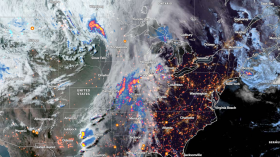Power plants in the U.S. may shut-down temporarily or reduce their power generation, due to rise in temperatures and sea levels, according to a new report published from the Department of Energy.
There have been many droughts, storms and wildfires in the recent years. Soaring temperatures along with shifts in rainfall pattern have caused power disruption that affected millions of people in the U.S. The agency said that these trends are likely to continue in the future, further denting the economy of the country.
The report called U.S. Energy Sector Vulnerabilities to Climate Change and Extreme Weather report shows that annual temperature across the U.S. increased by 1.5°F in the past century.
A recent report from a federal agency had also shown that sea-surface temperature along the Northeast coast last year had hit record-breaking levels.
Since 1980, over 130 extreme weather events have occurred in the U.S resulting in damages worth $US 1 billion. Superstorm Sandy, that hit the East Coast last year along with the extended drought, led to a damage of over $115 billion, L.A Times reported.
Storm related power shut-downs will get more frequent in the future, with an annual cost of $US 20 billion to $US 50 billion.
The energy Department said that by 2030, energy assets worth $1 trillion in the Gulf Coast region could be vulnerable to damage due to increased sea levels and frequent storms.
"As President Obama said in his speech last month, climate change is happening -- and the effects are already being felt across the country. 2012 was the hottest year on record; the worst drought in generations covered more than half the country; record wildfires swept across western states; and an intensified Superstorm Sandy devastated communities in the East," said April Saylor, spokesperson for the Department of Energy in a statement.
Greenpeace USA spokesman Robert Gardner said to the L.A Times that the government must shift its focus from fossil fuels to wind and solar power. "The question is why the Department of Energy is really focusing on continuing the problem which has caused this tidal wave of global warming," Gardner added.
© 2024 NatureWorldNews.com All rights reserved. Do not reproduce without permission.





